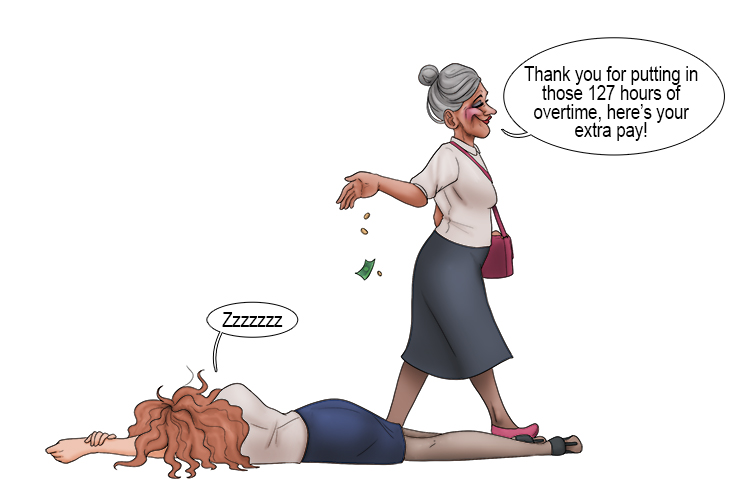Overtime – Time worked in addition to an employees normal working hours
(Pronounced oh-vuh-tiym)
To remember what overtime means use the following mnemonic:
It was way over the usual time (overtime) that I worked, but I was paid extra to work additional hours.

Overtime (work done above your normal contracted hours) has different rules and regulations in different countries.
In the US, the employer is legally required to pay employees at least 1.5 times the amount of their normal pay rate after 40 hours.
In the United Kingdom there are no rules about how much you should get paid for overtime, but it is often at a higher rate than normal working hours. The government rules in the UK can contractually force an employee to work up to 48 hours (if they have signed a contract), but whether this is paid at an overtime rate or not depends on the company. An employee can choose to work more hours but cannot be forced.
There are very strict limits on overtime for truck drivers in Europe, and if these are exceeded, a driver can lose their licence.
Many employers need employees to work overtime to help with changes in production. This can include a deadline for a project to be finished on time. Yearly variations can occur, for instance, when there is suddenly a run on cutting down Christmas trees ready for the seasonal increase in demand. Overtime can help businesses avoid the cost of hiring and training additional staff.
Here are some benefits of overtime for employees:
- Increased earnings: Employees who work overtime can earn extra money, improving their financial situation. Overtime is often paid at a higher rate than normal working hours, and the possibility of such pay can often be a deciding factor in whether or not someone applies for a position in the first place.
- Career advancement: Employees who are willing to work overtime may be seen as more valuable to their employers and therefore may be more likely to be promoted.
However, there are some negative points associated with working overtime, including:
- Increased stress: Overworking can lead to stress, which can have a negative impact on employee health and productivity.
- Reduced safety: Overworked, tired employees may be more likely to make mistakes, which can lead to accidents.
- Increased absenteeism: Overworked employees may be more likely to take sick leave or to miss work due to other commitments.
It is important for businesses to manage overtime carefully to avoid these risks.




